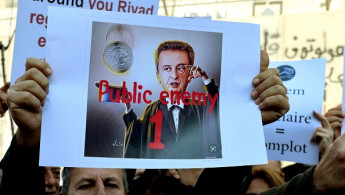Explainer: How Lebanon’s government sacrifices the judiciary to save bankers
Lebanon's government has endangered the independence of the country's judiciary, legal monitors have said after Lebanese Prime Minister Najib Mikati endorsed a controversial legal article to suspend proceedings against certain banks.
Mikati wrote a letter on 22 February instructing security forces not to implement the decisions of Mount Lebanon Public Prosecutor Ghada Aoun, who had ordered the lifting of banking secrecy on certain banks.
Mikati cited article 751 of Lebanon's civil law, which suspends legal proceedings if a court case is filed against the presiding judge.
"This is totally contrary to the principle of law, even to the principle of separation of powers. [Mikati] is giving governmental legitimacy to this practice," Nizar Saghieh, the co-founder of Legal Agenda, said to The New Arab.
Usually, the General Assembly of the Court of Cassation would rule on such cases and proceedings would then continue. However, the General Assembly has vacancies which prevent it from reaching quorum.
As a result, court cases whose presiding judge has had a case filed against them in the Court of Cassation are now suspended indefinitely.
Defendants in Lebanon have begun filing cases against the judge presiding over their case to stall the case.
Most famously, the Beirut port blast investigation was suspended for over a year after individuals sought in connection with the explosion filed cases against the judge, Tarek Bitar.
Banks ordered by the court to lift banking secrecy on their accounts have employed the same technique to indefinitely prevent the court order from being implemented.
Despite the abuse of the practice within courts, the Prime Minister's issuing his own interpretation of Article 751 endangers the independence of the judiciary, legal activists have said.
"Any defendant, in any case, is able to suspend that case by filing [a legal complaint]. Before, it was a practice of impunity. Now, it is a governmental policy of impunity," Saghieh said.
With no parliamentary sessions being held, no president and no appointed government in Lebanon it is unlikely that new members will be selected for the General Assembly of the Court of Cassation soon.
Legal Agenda and the Independence of the Judiciary Coalition have called on Lebanese MPs to reform the law to prevent the abuse of Article 751 so that Lebanon's judiciary can function.
In the absence of parliamentary sessions, however, the Independence of the Judiciary Coalition has called on lawyers and judges to act in a way that preserves the legitimacy of the judiciary.
"We call on judges to exercise necessity-based legal interpretation to stop the abuse of trial procedure to achieve absurd results that torpedo judicial work in its entirety," a 25 February statement by the Coalition read.
What judicial orders are the Prime Minister trying to prevent?
Judge Ghada Aoun had issued a series of decisions related to banking secrecy, prompting backlash from Lebanese banks and the country's political elite.
Lebanon historically had a restrictive banking secrecy law, which, unless under the orders of a special governmental commission, prevented the government from knowing the names of account owners and their activities.
In October, however, the Lebanese parliament amended the banking secrecy law, which allows the judiciary to lift banking secrecy by requesting account information directly from banks.
Judge Ghada Aoun had requested certain banks to lift banking secrecy to seek information about a reported US$9 billion that was lent from the Central Bank to Lebanese banks and subsequently misused.
Aoun's judicial order is a rare instance of a top judicial official trying to ensure accountability in the country's banking sector, which collectively mismanaged the country's deposits and contributed to the financial meltdown in 2019.
The banks have refused to comply with Aoun's court order.
Instead, they have retaliated in the form of a weeks-long banking strike, where employees refused to service account holders and ATMs. This prompted protests in Beirut as people were not able to access their accounts or receive their salaries through the banks.
"The banks are blackmailing the entire system … the judiciary, the people, the society and the legislators. Their message is clear, any court decision is against our service providence," Rafik Oreh Ghraizi, a spokesperson with the Depositors' Union, told TNA.
On 24 February, the Association of Lebanese Banks (ABL) agreed to open for four days, "at the wishes of the prime minister."
The decision to re-open came just two days after Mikati ordered security forces not to implement Aoun's decisions.
The ABL did not respond to a request for TNA's request for comment.
While the Prime Ministry spars with the judiciary to block its decisions to investigate Lebanon’s banks, the country's economy is in freefall.
The country's currency hit an unprecedented low of 91,000 to the dollar on Wednesday, an over 97 per cent devaluation of the lira's value in 2019.
With no president or government, reforms necessary to arrest the economy's nosedive are unlikely to be adopted anytime soon.





 Follow the Middle East's top stories in English at The New Arab on Google News
Follow the Middle East's top stories in English at The New Arab on Google News


